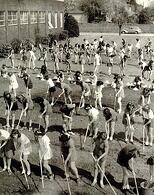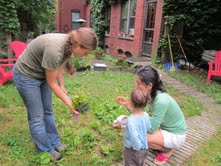 It seems every week there is a new high profile article touting the benefits of eating ‘farm to school’ local produce and planting school gardens. The New York Times, The Boston Globe, Mother Earth News and more have reported on the growth of school gardens across the country. From the White House lawn garden to the wealth of urban farming and school garden projects happening in the Boston area, the movement seems to be on the rise.
It seems every week there is a new high profile article touting the benefits of eating ‘farm to school’ local produce and planting school gardens. The New York Times, The Boston Globe, Mother Earth News and more have reported on the growth of school gardens across the country. From the White House lawn garden to the wealth of urban farming and school garden projects happening in the Boston area, the movement seems to be on the rise.
A recent USDA Farm to School Census from 2011-2012 estimated that 43% of schools in the United States adopted farm to school practices, which encompasses school gardens, engagement with local farmers and providing local foods in cafeterias. Twenty one million students and counting have engaged with farm to school practices. This is a movement that is not going away any time soon.

It turns out that school gardens are nothing new, though their public profile has increased only recently. The history of school gardens has its roots in late 19th Century Europe, but have been popular in the US since the social reform movements of the early 20th Century. Victorian-era nature education programs, nationwide war efforts, and victory gardens all increased vegetable gardens in schools. The counter culture movement of the 1960s and 70s saw a later surge in popularity of gardening education. The current focus on environmental sustainability as well as a rethinking and rebirth of progressive education have caused the recent increase in the farm to school concept and school gardens curriculum.



